Superior Food Grade Flooring WA Culinary Spaces Are Looking For
2-Year Product & Workmanship Warranty
WA's Specialised Food Grade Flooring
In Western Australia, with its fast-paced food industry, more than 30–50% of all health and safety incidents result from poor floors.
It’s a shocking number that underscores an important part of food production (which often gets overlooked amidst the whirlwind machinery) too—how crucial food-grade flooring is.
Business owners are often frustrated with the difficulty of keeping clean, long-lasting, and easy-to-manage flooring in their companies; not only is this a safety hazard, but it also makes for an unsustainable work environment.
Step up, PM Industries—your saviour in the flooring rut. We are committed to achieving the best flooring in WA that is specifically designed for the food industry.
Our flooring solutions not only ensure safety but also enhance efficiency and cleanliness in your operations.
Free Quotes Within 48 Hours
They understand the food industry: Our experienced team of experts has years of knowledge and can work with you to create a long-lasting flooring solution.
Our flooring experts pride themselves in supplying the best quality materials and most advanced installation systems that are tailored to meet Australian health benchmarks and your business’ requirements.
Ready to upgrade your flooring? Contact us today at PM Industries for a consultation or no-obligation quote. Make your workspace a safer, more productive place with our professional services.
On this Page:
- How do I know if I need food grade flooring in WA?
- What factors affect food grade flooring costs?
- How long does the installation take?
- How can I identify a professional food grade flooring installer?
- WA What Flooring is Best Used for the Food Industry?
- What Type of Material Should Be Used for Flooring in Food Preparation Areas?
How do I know if I need food grade flooring in WA?
This is a question many business owners in the food industry grapple with. The answer lies in assessing your current flooring’s performance and compliance.
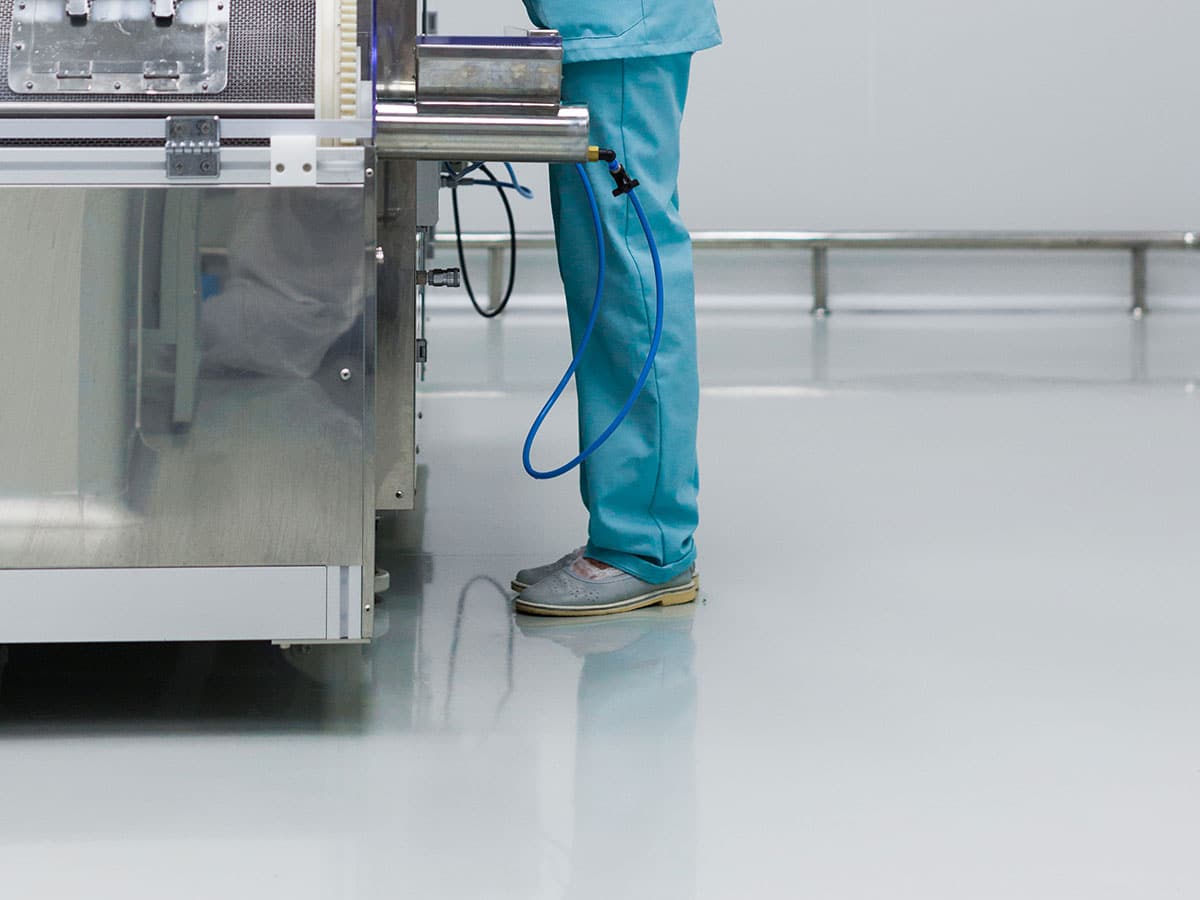
If you are experiencing issues like excessive wear, challenges with cleaning, or difficulties in meeting health and safety regulations, you should consider replacing the flooring.
When you are building a new facility or renovating an old one, the peace of mind that comes from having a brand new floor is just unbeatable.
When it comes to safety, nothing is more important than a food-grade floor – no matter the size of your business, whether it’s a little corner cafe or an industrial-level facility. It’s not just a matter of adhering to regulatory standards but rather maintaining a clean, safe and productive work environment.
PM Industries has you and your flooring needs covered. From texture coatings to chemical-resistant services, we have options available to meet your company’s specific needs.
Don’t allow subpar flooring to jeopardise the quality and safety of your food and beverages. PM Industries will evaluate your current floor status.
Our staff can also give you the right kind of advice according to your specific requirements and you can trust that with us, it is an investment in flooring for your business.
What factors affect food grade flooring costs?
The price can range quite a bit, though, depending on a number of things, including the size of the space, the type of flooring materials used, and the installation complexity, as well as any extra features you might want.
- Basic Flooring: This will be your basic epoxy or polyurethane cement flooring that is good for light to moderate use.
- Superior Flooring: Mid-range quality, includes exotic hardwood and other materials with improved features such as a more durable wear layer.
Get these details by simply requesting a customised quote from PM Industries today and making sure you get the most value and performance out of your flooring solution.
How long does the installation take?
Installation process may vary depending upon several factors.
Factors to consider include the amount of flooring that needs to be installed, the kind of material preferred, the condition and type of the subfloor and the difficulty level of the installation.
Here’s an unofficial guide to help you understand the average timelines for most:
- Small Areas (up to 50 sqm): Installation on small areas is usually done within 1-2 days with good condition of the existing floor and little amount of preparation.
- Middle Area (51 sqm to 100 sqm): Installation time on medium areas will be around 2-4 days. This includes time for surface preparation, flooring material application and curing.
- Over 101 sqm: For bigger projects, they may take up to a week.
- Time-consuming: These projects typically involve a lot of preparation, repeated applications of layered flooring and extremely long curing times for the layers to dry.
- Custom Projects: If you are looking to have custom flooring designs, intricate patterns, or special features (such as nonslip or chemical resistance), the timeline for your project can be longer. Detailed planning and execution are required for such projects.
One consideration you should keep in mind is that the amount of time your floor covering takes to cure may affect the total span too. The installation will be finished within a couple of days, but the floor may not cure fully in this time period to allow for regular operational use.
Our logistics is where our expertise shows; we make all efforts to deliver each project so as to limit your downtime. Our guys come ready to work and ensure that we have you installed as fast as possible without sacrificing safety or integrity.
We include a defined schedule from the onset of the project to give you an accurate idea of when your new flooring will be ready for use.
Please contact PM Industries for a more detailed schedule based on your custom requirements, and let us assist you in scheduling your flooring project so that it doesn’t interfere with the daily flow of your workday.
How can I identify a professional food grade flooring installer?
When searching for a professional flooring installer, it’s important to search for certain traits that are necessary to follow the industry’s strict guidelines of safe and food-compatible methods. Here’s what to look for:
- Certification & Compliance: It is essential that your professional installer complies with Australian standards and food safety regulations. Obtain certifications that show the floor is acceptable for food processing.
- Sanitary and Easy to Clean: Its surface must be non-porous and continuous, avoiding the deposit of bacteria, mould, and other microorganisms. It needs to be simple to clean and maintain, tolerating frequent washing and sanitising.
- Tough and Resistant: Quality flooring is tough and wear-resistant. You need it to be durable, resisting heavy foot traffic and the movement of equipment as well as protecting against dropped objects. Moreover, it should also be chemically, thermally and moisture resistant.
- Slip Resistance: While in food processing rooms, safety is most important. Professional-grade installers even include anti-slip to minimise slip accidents, especially in wet or grease/oil conditions.
- Functional and Attractive: Although functionality is everything, commercial flooring may also be attractive, with features such as coatings that come in different colours that can separate areas or improve the general look of your building.
- Professional Installation Required: Professional installation is required to ensure perfect fitment. A properly installed floor is one containing even surfaces and correct slopes in a case where there shall be drainage and does not have any voids or cracks.
- Guarantee and Support: The companies you chose for the product and installation should give you a guarantee, as well as provide support for maintenance and repairs.
PM Industries is proud to offer professional flooring solutions that meet all the aforementioned criteria. We take pride in offering high-quality, safe and compliant flooring products that are perfect for your needs.
By choosing PM Industries, you can be confident that your floors will be safe, clean and customised to meet the specific requirements of your business.
For real-world evaluation and advice on the right floor for you, consult PM Industries now. Our flooring experts will help you choose a floor that is more than just functional!
Our Gallery of Finished Projects
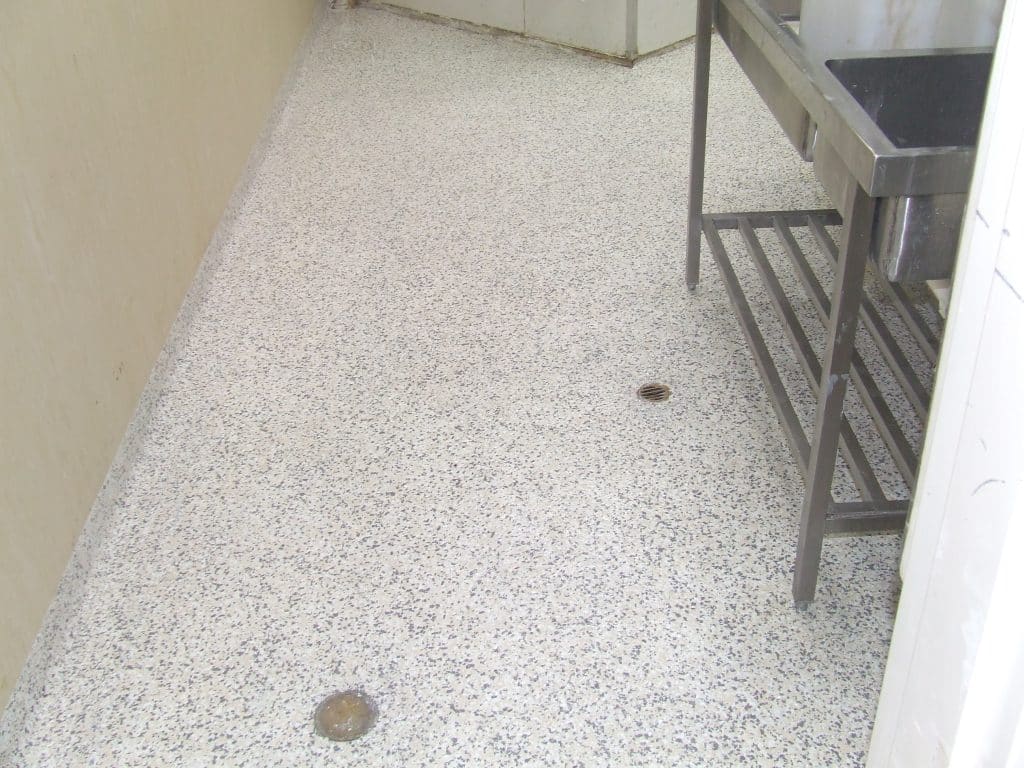
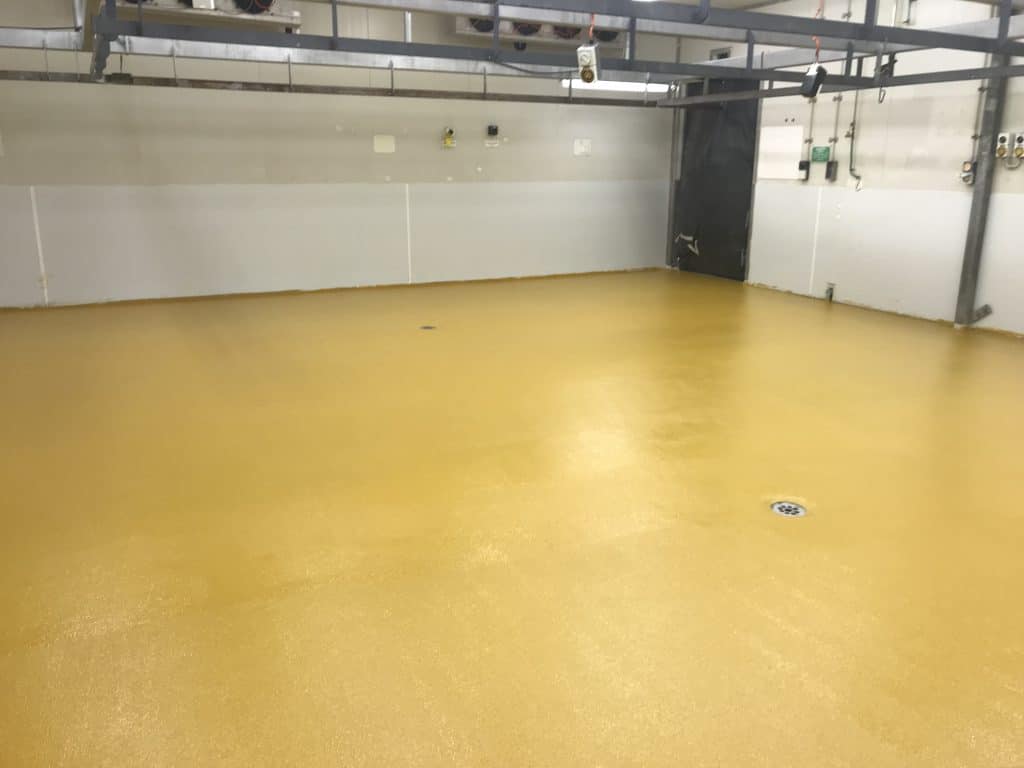
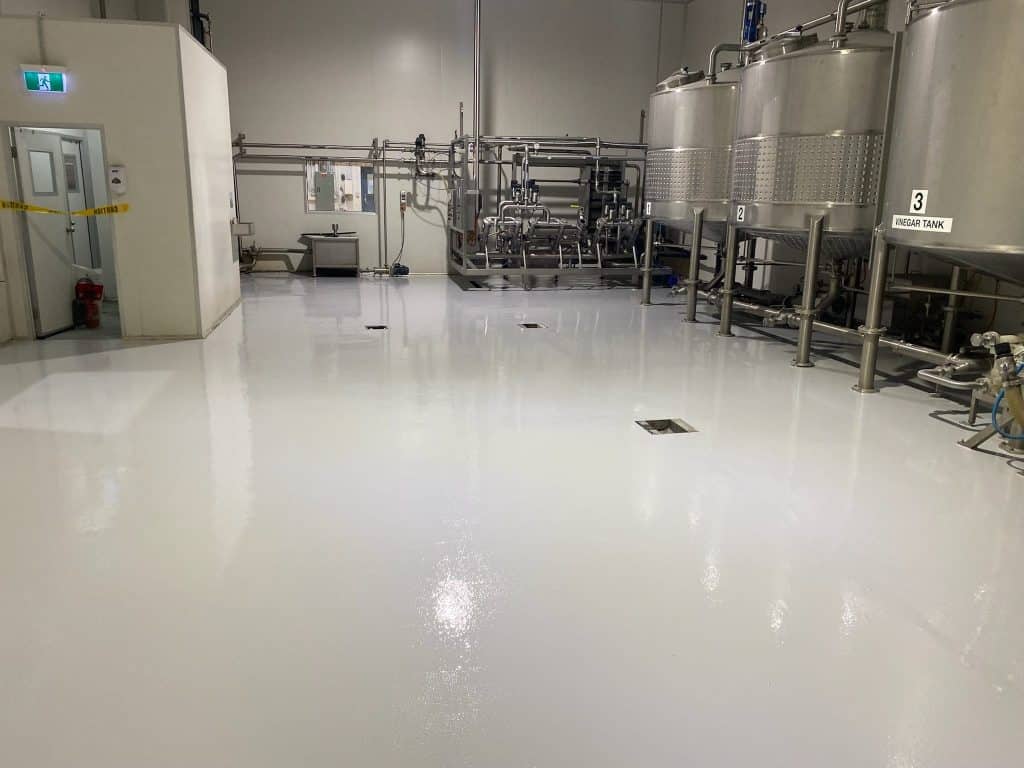
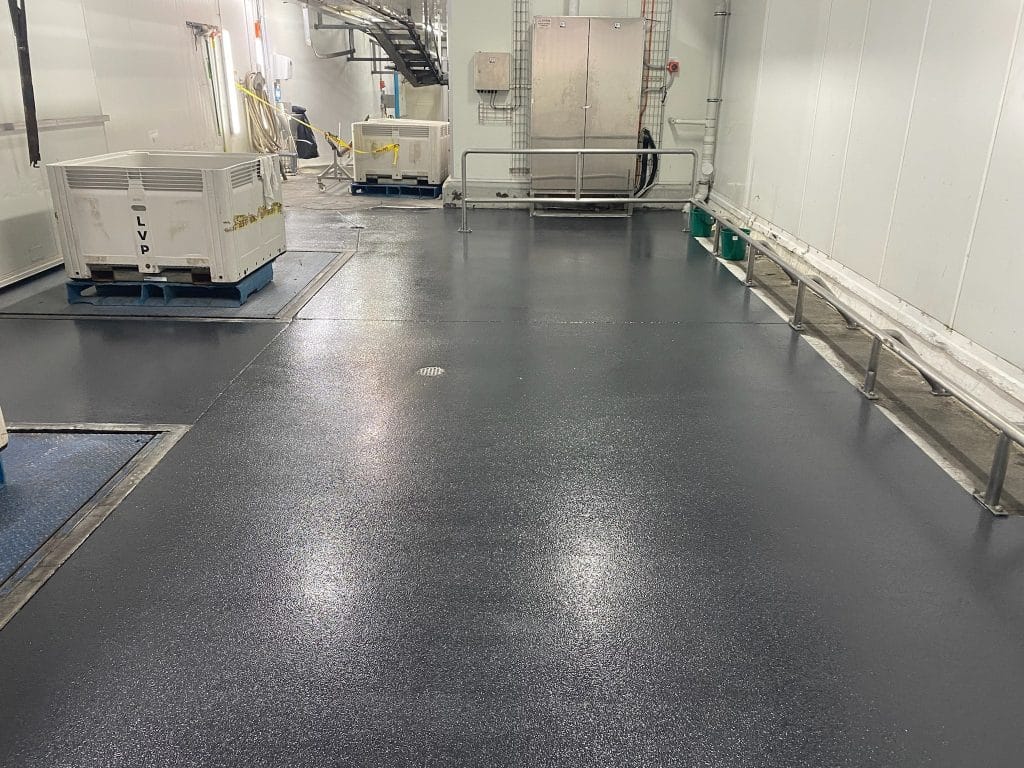
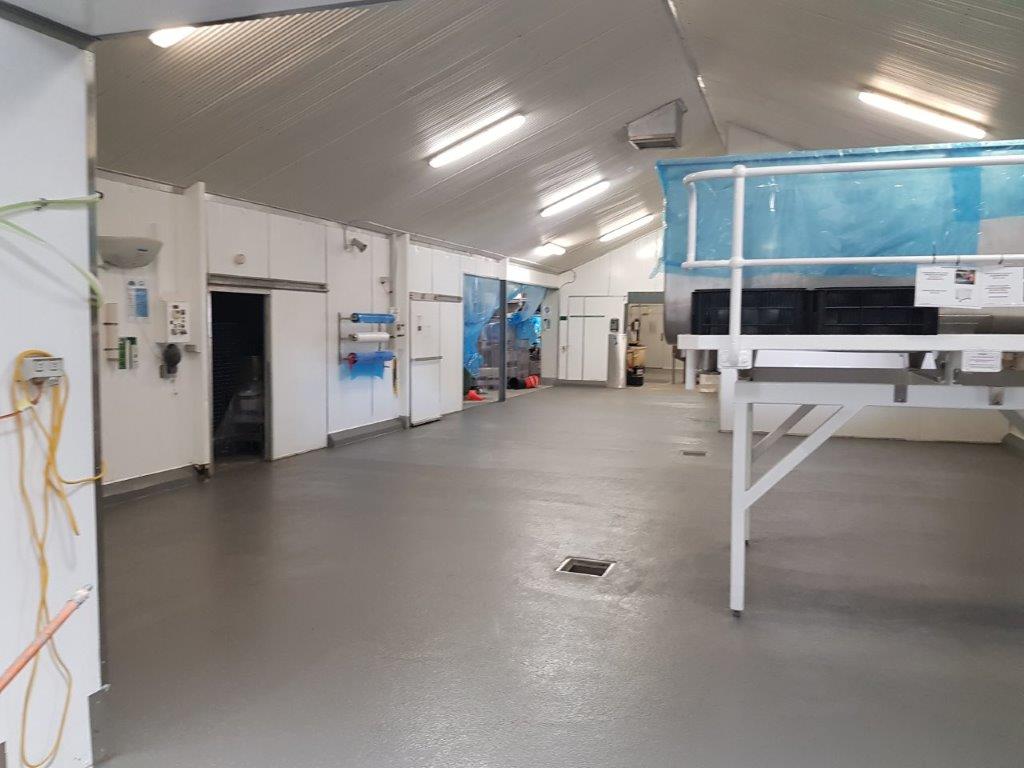


Frequently Asked Questions About Food Grade Flooring in WA
WA What Flooring is Best Used for the Food Industry?
The ideal flow for the food industry is one of hygiene, safety, and efficiency. The optimal type of gym flooring often comes down to the unique requirements of the establishment. Here are some of our top recommended choices:
- Epoxying Flooring: When installing epoxy floors they are often used in the food industry, because this kind of flooring is durable, easy to maintain and impermeable to the temperature or harsh cleaning chemicals. They give a smooth non-porous surface which is perfect for hygiene and easy cleaning.
- Polyurethane Floor: This type of floor is tough and has more tolerance to the temperature especially places with a huge difference of it such as cold storage rooms. It’s also impervious to chemicals and heavy wear, which makes it a long-lasting option for high-traffic areas.
- Vinyl Flooring: It is reasonable in cost and offers a very quality finish to the flooring. It’s also easy to clean and maintain, so it can work in dining areas and light-use kitchens.
- Anti-Slip Flooring: Food and safety go hand in hand. Anti-slip floor coatings, available in both epoxy and polyurethane systems, are also crucial for any area where spills or moisture may accumulate.
- Sealed and Densified Concrete: Raw concrete following proper maintenance may not be adequate for the food industry, but treated with sealers and densifiers, it can be.
- Tiles: Some types of tile, including a type known as quarry tiles, are great options for spaces that will be regularly and intensively cleaned. But they might be more upkeep with the grout.
- Custom: In some cases, a hybrid of platforms or a customised solution may be best, especially for operations with multiple areas (production/processing zones, cold storage, packaging and so on.
We realise that each food processing plant is different at PM Industries.
Our professionals can help you select the ideal flooring option according to conditions such as what is going on in your facility, cleaning considerations and foot and machinery traffic, in addition to budget requirements.
Reach out to PM Industries directly, and an end-to-end evaluation and custom solution will be put forward on the best flooring options for your food industry needs.
We strive to deliver with flooring solution which comply with the industry standards and also improve your productivity and safety.
What Type of Material Should Be Used for Flooring in Food Preparation Areas?
The right flooring material is crucial when it comes to hygiene, safety and complying with industry regulations. Below are some of the best flooring options for wet areas:
- Epoxy: One of the best options for food prep areas is epoxy resin flooring. It’s extremely durable; seamless, which means it has no crevices where germs can hide; and non-porous, so it can be quickly wiped clean and sanitised. Epoxy is also resistant to several different chemicals and can be made to have anti-skid properties.
- Polyurethane Concrete Resurfacing: Strong, as well as tolerant to hot pouring and freezing. Most popular uses: Kitchens, any cold or hot processing areas, Polyurethane concrete is also designed to withstand chemicals, impacts and abrasions—perfect for high-traffic areas.
- Vinyl Composite Tile (VCT): Vinyl is reasonably priced and good for low-use food prep areas. It is an easy to care for clean smooth surface. But in high-impact areas, it may not hold up as well as epoxy or polyurethane.
- Quarry Tile: A classic for commercial kitchens because of its strength and slip-resistance. It’s durable against the elements and resistant to high heat, heavy foot traffic. But it needs regular maintenance, particularly in the grout lines to prevent bacteria build up.
- Antimicrobial Treated Floors: Certain types of floors have antimicrobial treatments that protect the growth of bacteria, mold and mildew. These are very welcomed in kitchens where cleanliness is of utmost importance.
- Sealed Concrete + Additives: Properly sealed and treated concrete floors can create a perfect combination of durability and cleanliness. Additives may comprise non-slip textures or antimicrobial characteristics.
At PM Industries we focus on fitting and testing the perfect floor covering for food prep areas.
Our staff takes into account your exact food handling procedure, cleaning protocol and sanitary requirements to help you select the best performance floor.
It is important to choose the appropriate flooring for your food prep facility in order to provide safe, sanitary, and productive spaces. Allow PM Industries to provide you with the know how, and installation that best fits your specific application.
